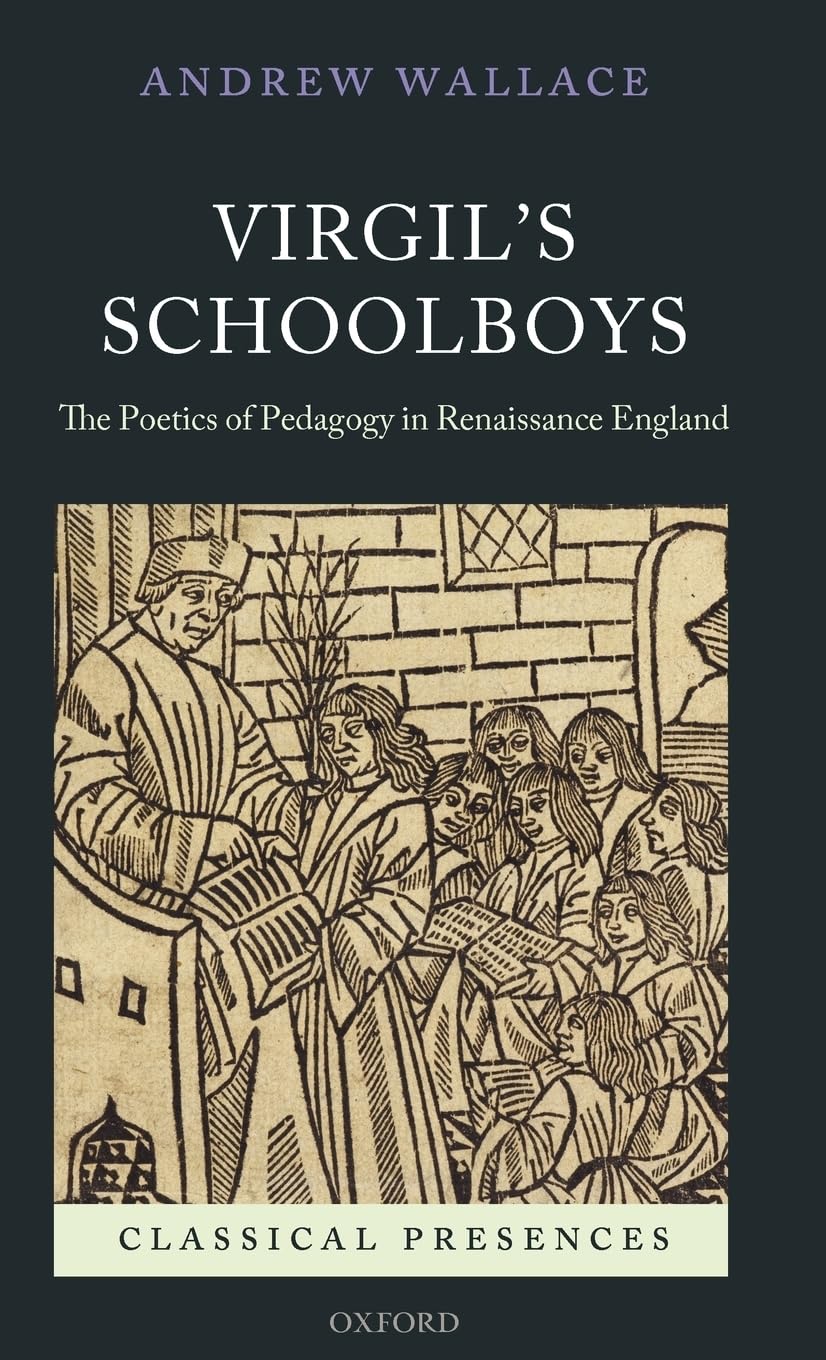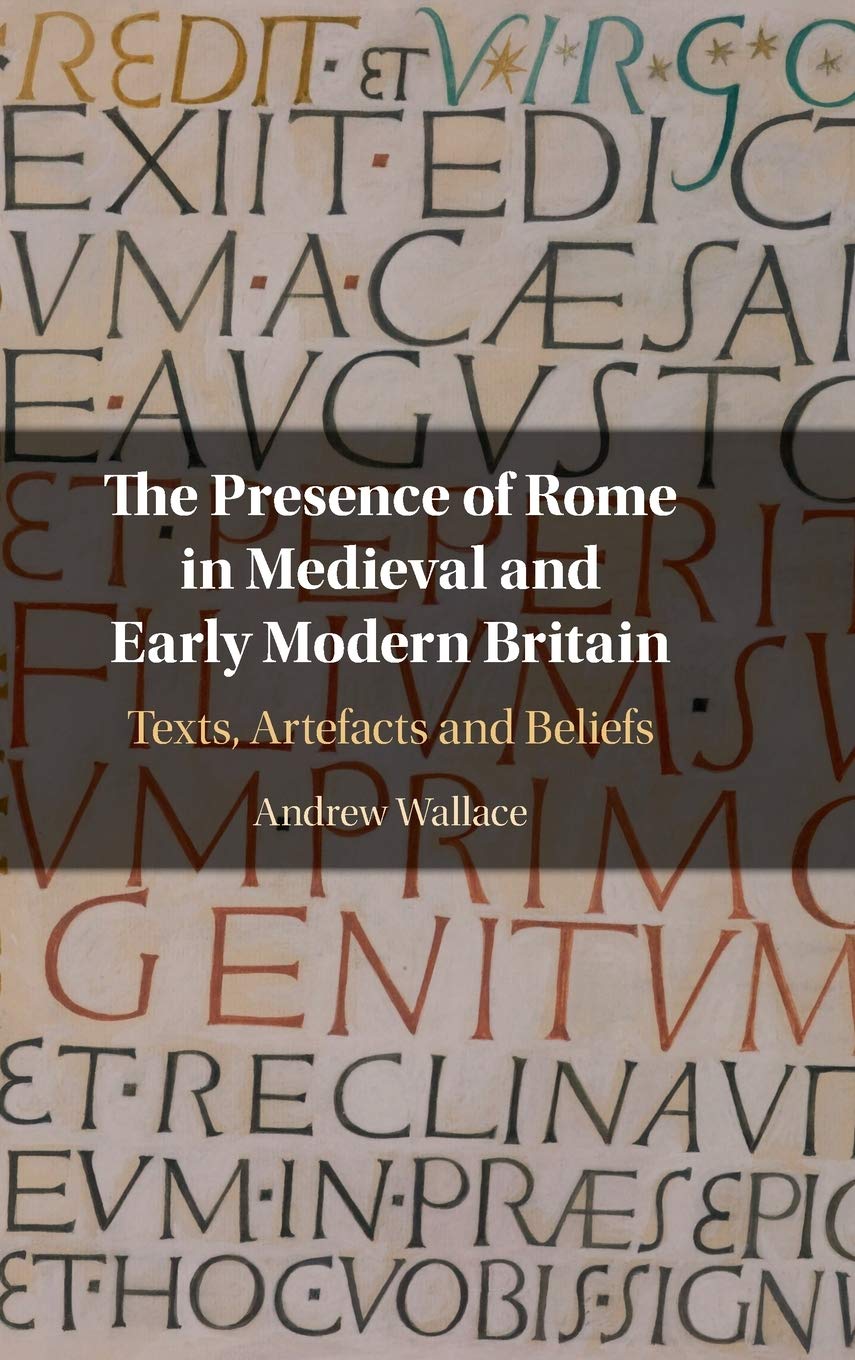Andrew Wallace

Professor
- B.A. Honours Trinity College, University of Toronto; M.A. and Ph.D., University of Toronto
- Email Andrew Wallace
Research Interests
- Renaissance literature (especially Spenser and Milton)
- The classical tradition (especially Greek tragedy, Virgil, Ovid, Seneca, and the reception and reinvention of classical texts and culture during the Middle Ages and Renaissance)
- Medieval literature (especially Dante and Chaucer)
- Relations between classical philology and modern philosophy
Current Research

My first monograph, Virgil’s Schoolboys: The Poetics of Pedagogy in Renaissance England (Oxford University Press, 2010), studies the ties that bind schoolmasters and schoolboys to the poems upon which they exercised their attentions in the grammar schools of Renaissance England. The book advances three central claims: that schoolmasters and commentators repeatedly confront the possibility that Virgil is always-already a serious theorist of the elusive exchanges we call instruction; that the interpretations these authorities cast as discoveries about the inner workings of Virgil’s poems are underwritten by humanist pedagogy’s fascination with the iconographic power of the physical presence of the master at the proving ground of his lessons; and that Virgil’s pedagogical afterlife testifies to the ways in which the day-to-day business of the grammar schools fostered in schoolboys a simultaneously timorous and eager relation to texts, interpretation, masters, and indeed to the concept of mastery itself.

My second monograph, The Presence of Rome in Medieval and Early Modern Britain: Texts, Artefacts and Beliefs (Cambridge University Press, 2020), studies the cultural and intellectual stakes of Medieval and Renaissance Britain’s sense of itself as forever living under the shadow of Rome–that is, as living under the shadow of a city whose name could serve as shorthand for the ancient, fallen, quintessentially human power that had once conquered and colonized Britain, and also for the alternately sanctified and demonized edifice of the Roman Church. The book argues that the “fact” of Rome insinuates itself not just into arts of rhetoric, rules of reason, or conceptions of nationhood and Christian discipline, but into the thinking individual’s relation to the self, and into the processes by which men and women make themselves at home in what the philosopher Stanley Cavell calls “the ordinary.”
I am currently writing a monograph on the subject of the loss and rediscovery of ancient Greek and Roman tragic texts, with special attention to sudden, unexpected dialogues between philology and philosophy.
Monographs
Virgil’s Schoolboys: The Poetics of Pedagogy in Renaissance England. Oxford University Press. 2010.
The Presence of Rome in Early Modern Britain: Texts, Artefacts and Beliefs. Cambridge University Press. 2020.
Co-Edited Volume
Taking Exception to the Law: Materializing Injustice in Early Modern English Literature, ed. Donald Beecher, Travis DeCook, Andrew Wallace, and Grant Williams (University of Toronto Press, 2015).
Refereed Essays and Book Chapters
“Education,” John Donne in Context, ed. Michael Schoenfeldt (Cambridge: Cambridge University Press, 2019), 131-138.
“Pedagogy, Education, and Early Career.” Edmund Spenser in Context, ed. Michael Schoenfeldt (Cambridge: Cambridge University Press, 2016), 7-13.
“Spenser’s Dead,” Spenser Studies 30 (2016): 255-270.
“‘What’s Hecuba to him?’: Pain, Privacy, and the Ancient Text.” Ars Reminiscendi: Mind and Memory in Renaissance Culture, ed. Donald Beecher and Grant Williams (Toronto: University of Toronto Press, 2009), 231-243.
“Edmund Spenser and the Place of Commentary.” Spenser Studies 22 (2007): 153-170.
“Virgil and Bacon in the Schoolroom.” The Journal of English Literary History (ELH), 73 (2006): 161-185.
“Reading the 1590 Faerie Queene with Thomas Nashe.” Studies in the Literary Imagination 38.2 (2005): 35-49.
“‘Noursled up in life and manners wilde’: Spenser’s Georgic Educations.” Spenser Studies 19 (2004): 65-92.
“Placement, Gender, Pedagogy: Virgil’s Fourth Georgic in Print.” Renaissance Quarterly 56 (2003): 377-407.
Forthcoming Essays and Book Chapters
“Poetry and Pedagogy: Lyric Voices and the Grammar of the Self,” Oxford Handbook of Renaissance Poetry, ed. Jason Scott-Warren and Andrew Zurcher. Expected publication date is Fall 2020.
Conference Presentations
“The Afterlives of Roman Britain.” Early Modern Rome 3, Rome, October 2017.
“Affect, Allegory, and the Elizabethan Schoolroom.” Renaissance Society of America, Berlin, March, 2015.
“What do the Living Want from the Dead? Spenser and the Human Figure.” Renaissance Society of America, San Diego, March, 2013.
“Edmund Spenser and the Fact of Rome.” MLA Annual Convention, Boston, January 2013.
“John Milton and the Fact of Rome.” Canada Milton Seminar, Victoria College, Toronto, April 2012.
“England’s Grammar Schools and the Spectre of Rome.” MLA Annual Convention, Seattle, January 2012.
“After Rome.” Renaissance Society of America, Montreal, March 2011.
“Calling it Tragedy.” Renaissance Society of America, Venice, April 2010.
“What Does The Faerie Queene Want? Virgil, Spenser, and the Elizabethan Grammar School.” Renaissance Society of America, Los Angeles, March 2009.
“‘What’s Hecuba to him?’: Pain, Privacy, and the Ancient Text.” Renaissance Society of America, Miami, April 2007.
“Everyone Knows What Happened at Troy.” MLA Annual Convention, Philadelphia, December 2006.
“Forgetting Epic in Early Modern England,” “Ars Reminiscendi : Mind and Memory in Renaissance Culture,” Carleton University, June 2006.
“E.K and his Discontents: The Critical Moment in Early Modern England,” Fourth International Spenser Society Conference,” Toronto, May 2006.
“Pastoral and the Painful Schoolmaster,” ACCUTE, London, Ontario, May 2005.
“Virgil’s Schooldays: Culture and Translation in the Early Modern Schoolroom,” Renaissance Society of America, Cambridge, England, April 2005.
“‘Noursled up in life and manners wilde’: Practicing Instruction in The Faerie Queene,” Renaissance Society of America, New York, New York, May 2004.
“Text and Paratext in the 1590 Faerie Queene: Reading the Dedicatory Sonnets as Gloriana’s Feast,” International Congress on Medieval Studies, Kalamazoo, Michigan, May 2003.
“What is Georgic?: The Poet’s Labours and the Georgic Metaphor in The Faerie Queene (1590),” Renaissance Society of America, Tempe, Arizona, April 2002.
“Nabokov’s Metamorphoses: Translation and Transformation in Ada,” Nabokov Centennial Panel II. MLA Annual Convention, Chicago, December 1999.
Recent Graduate Courses
ENGL 5303—Renaissance Studies: “Allegory and the Ordinary: Spenser’s Faerie Queene and Wittgenstein’s Philosophical Investigations”
ENGL 5308—Renaissance Studies: “After Rome: Medieval and Renaissance Perspectives on Roman Britain”
ENGL 5308—Renaissance Studies: “Tragedy!”
ENGL 5308—Renaissance Studies: “The Afterlife of the Ancients: Classical Culture and the Origins of Modernity”
ENGL 5308—Renaissance Studies: “John Milton’s Poetry and Prose”
ENGL 5308—Renaissance Studies: “Renaissance Literature and the Renaissance Schoolroom”
Ph.D. Dissertation Committees
Hisham Al Khatib. Dissertation on Renaissance literature. In progress.
Amal El-Mohtar. Dissertation on 19th-century literature
Danielle Taylor. Dissertation on Medieval literature. In progress.
Alexander Grammatikos. Dissertation on British Romanticism and Nineteenth-Century Greece. Complete.